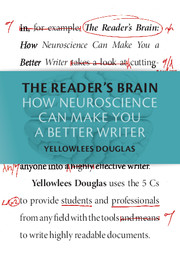Book contents
- Frontmatter
- Dedication
- Contents
- Acknowledgments
- 1 So much advice, so much lousy writing
- 2 The new science of writing
- 3 Choosing words and structuring sentences The first C: Clarity
- 4 Putting sentences together The second C: Continuity
- 5 Organizing paragraphs and documents The third C: Coherence
- 6 Maximizing efficiency The fourth C: Concision
- 7 Making music with words The fifth C: Cadence
- Supplement: Everything you ever wanted to know about grammar, punctuation, and usage – and never learned
- Endnotes
- Select Bibliography
- Index
6 - Maximizing efficiency The fourth C: Concision
Published online by Cambridge University Press: 05 July 2015
- Frontmatter
- Dedication
- Contents
- Acknowledgments
- 1 So much advice, so much lousy writing
- 2 The new science of writing
- 3 Choosing words and structuring sentences The first C: Clarity
- 4 Putting sentences together The second C: Continuity
- 5 Organizing paragraphs and documents The third C: Coherence
- 6 Maximizing efficiency The fourth C: Concision
- 7 Making music with words The fifth C: Cadence
- Supplement: Everything you ever wanted to know about grammar, punctuation, and usage – and never learned
- Endnotes
- Select Bibliography
- Index
Summary
In this chapter you will
• learn how to recognize and eliminate redundant pairs
• discover how to spot and weed out unnecessary narration, hedges, and amplifiers
• understand why you should avoid using negatives
• know how to recognize linguistic fossils and throat-clearing.
PRESIDENT: Well, you had quite a day, today, didn't you? You got, uh, Watergate, uh on the way, huh?
HALDEMAN: How did it all end up?
DEAN: Uh, I think we can say “Well” at this point. The, uh, the press is playing it just as we expect.
HALDEMAN: Whitewash?
DEAN: No, not yet; the, the story right now –
PRESIDENT: It's a big story.
DEAN: Yeah.
PRESIDENT: (Unintelligible)
HALDEMAN: Five indicted,
DEAN: Plus,
HALDEMAN: Just so they have the fact that one of –
DEAN: plus two White House aides.
HALDEMAN: Plus, plus the White House former guy and all that. That's good. That, that takes the edge off whitewash, really – which – which was the thing Mitchell kept saying that …
PRESIDENT: Yeah.
In 1974, the Chicago Tribune published a forty-four-page excerpt of taped Oval Office conversations, unedited and never intended for public consumption. The meeting, held September 15, 1972, followed on the heels of the press airing a link between the Nixon Administration and five men arrested during a break-in at Democratic Party headquarters, which they clearly intended to bug. At the time, the American public found Nixon's vocabulary shockingly rich in the four-letter words some media outlets still touchingly bleep out as if protecting our tender ears from corruption. But this snippet of business-as-usual conversation in the White House might also seem remarkable for the lack of real information traded between an American president, his Chief of Staff, and the White House Counsel.
- Type
- Chapter
- Information
- The Reader's BrainHow Neuroscience Can Make You a Better Writer, pp. 118 - 141Publisher: Cambridge University PressPrint publication year: 2015

